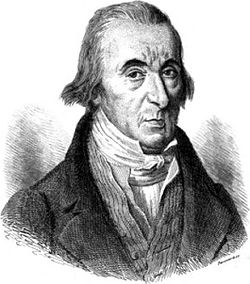Louis-Marie Prudhomme
Louis-Marie Prudhomme (* 1752 in Lyon , † April 20, 1830 in Paris ) was a French revolutionary, writer and journalist.
Life
Louis-Marie Prudhomme initially worked as a librarian in Lyon and Paris and then settled as a bookbinder in Meaux . When he returned to Paris, he was imprisoned several times for his writings: between 1787 and 1789 he is said to have written around 1,500 diatribes, including the three-volume work Résumé général, ou Extrait des cahiers de pouvoirs, instructions, demandes ou doléances remis par divers bailliages, sénéchaussées et pays d'État du royaume , which he published with Laurent de Mezières and the politician Jean Rousseau in 1789 and which was confiscated by the police.
From July 12, 1789 to February 28, 1794 - during the French Revolution - he published one of the most important newspapers: Révolutions de Paris . The chief author until his death in September 1790 was Élisée Loustalot , other authors and collaborators: Sylvain Maréchal , Pierre Gaspard Chaumette and Fabre d'Églantine . At times Prudhomme was imprisoned as a royalist . In June 1793 he left Paris and initially withdrew from political life.
In 1797 he published l'Histoire générale et impartiale des Ereurs, des fautes et des crimes commis pendant la Révolution française (six volumes), a work that was confiscated by the police of the Directory . Later, from June to October 1799, he edited 105 issues of the daily newspaper le Voyageur . In the same year he became director of the hospitals in Paris, but continued his work as a writer, publicist and translator.
As an opponent of the First French Empire , he welcomed the restoration of the Bourbon monarchy in 1814 . In 1825 he published L'Europe tourmentée par la Révolution de France, ébranlée par dix-huit années de promenades meurtrières de Napoléon Bonaparte (two volumes).
| personal data | |
|---|---|
| SURNAME | Prudhomme, Louis-Marie |
| BRIEF DESCRIPTION | French revolutionary, writer and journalist |
| DATE OF BIRTH | 1752 |
| PLACE OF BIRTH | Lyon |
| DATE OF DEATH | April 20, 1830 |
| Place of death | Paris |

